Science
(www.olympiadsuccess.com)
Chapter 11: Light, Shadows and Reflections
Class: VI
Exemplar Solutions
Multiple Choice Questions
Question 1
Observe the picture given in Fig. 11.1 carefully.
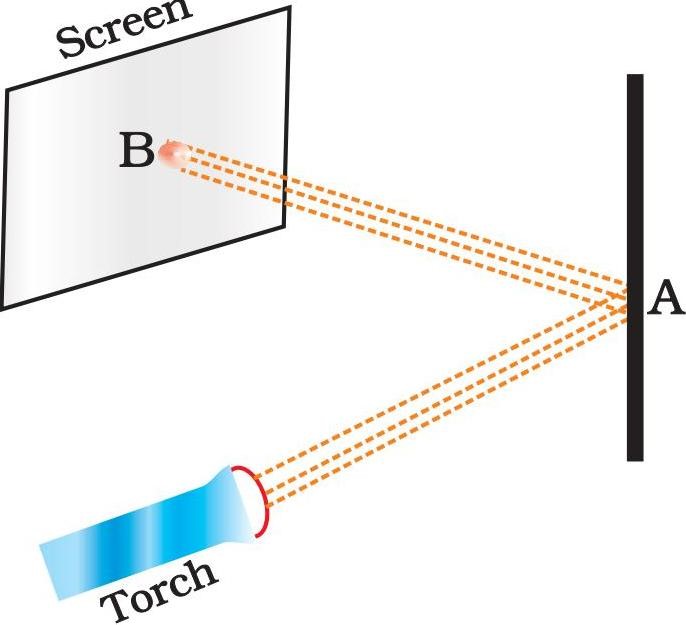
Fig.11.1
A patch of light is obtained at B, when the torch is lighted as shown. Which of the following is kept at position A to get this patch of light?
(a) A wooden board
(b) A glass sheet
(c) A mirror
(d) A sheet of white paper
Answer 1
(c)
Question 2
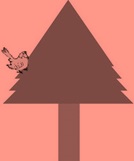
Fig.11.2
A student observes a tree given in Fig. 11.2 through a pin-hole camera. Which of the diagrams given in Fig. 11.3 (a) to (d), depicts the image seen by her correctly?
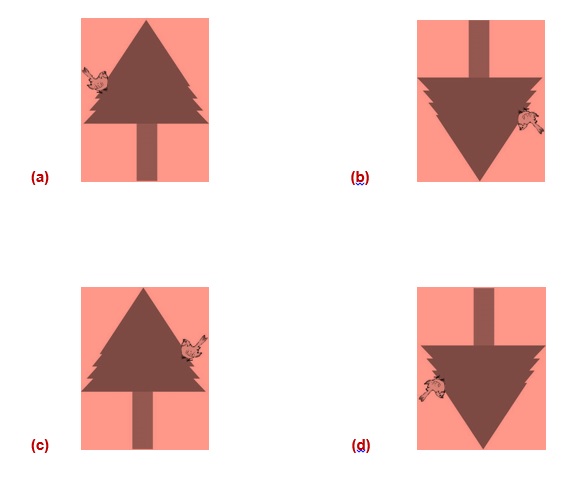
Fig.11.3
Answer 2
(b)
Question 3
Four students A, B, C and D looked through pipes of different shapes to see a candle flame as shown in Fig. 11.4.
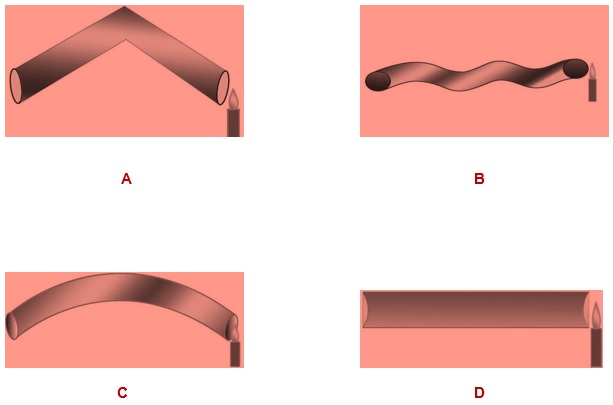
Fig.11.4
Who will be able to see the candle flame clearly?
(a) A (b) B
(c) C (d) D
Answer 3
(d)
Question 4
Which of the following is/are not always necessary to observe a shadow?
(a) Sun (b) Screen
(c) Source of light (d) Opaque object
Answer 4
(a)
Question 5
Paheli observed the shadow of a tree at 8:00 a.m., 12:00 noon and 3:00 p.m. Which of the following statements is closest to her observation about the shape and size of the shadow?
(a) The shape of the shadow of the tree changes but the size remains the same.
(b) The size of the shadow of the tree changes but the shape remains the same.
(c) Both the size and shape of the shadow of the tree change.
(d) Neither the shape nor the size of the shadow changes.
Answer 5
(c)
Question 6
Which of the following can never form a circular shadow?
(a) A ball
(b) A flat disc
(c) A shoe box
(d) An ice cream cone
Answer 6
(c)
Question 7
Two students while sitting across a table looked down on to its top surface. They noticed that they could see their own and each other’s image. The table top is likely to be made of:
(a) unpolished wood
(b) red stone
(c) glass sheet
(d) wood top covered with cloth
Answer 7
(c)
Very Short Answer Questions
Question 8
You have 3 opaque strips with very small holes of different shapes as shown in Fig. 11.5. If you obtain an image of the sun on a wall through these holes, will the image formed by these holes be the same or different?

Fig.11.5
Answer 8
The image obtained will be the same in all the three cases.
Question 9
Observe the picture given in Fig. 11.6. A sheet of some material is placed at position ‘P’, still the patch of light is obtained on the screen. What is the type of material of this sheet?

Fig.11.6
Answer 9
A sheet of transparent material is placed at ‘P’.
Question 10
Three torches A, B and C shown in Fig. 11.7 are switched on one by one. The light from which of the torches will not form a shadow of the ball on the screen.
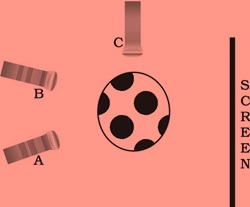
Fig.11.7
Answer 10
The light of torch at position C will not form a shadow of the ball on the screen.
Question 11
Look at the figure given in Fig. 11.8.
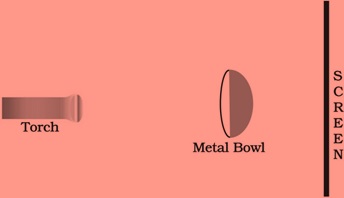
A

B
Fig.11.8
Will there be any difference in the shadow formed on the screen in A and B.
Answer 11
No, both the shadows formed on the screen would be the same.
Short Answer Questions
Question 12
Correct the following statements.
(i) The color of the shadow of an object depends on its color of the object.
(ii) Transparent objects allow light to pass through them partially.
Answer 12
(i) The color of the shadow of an object does not depend on its color.
(ii) Translucent objects allow light to pass through them partially or transparent objects allow
most of the light to pass through them.
Question 13
Suggest a situation where we obtain more than one shadow of an object at a time.
Answer 13
We can obtain more than one shadow of an object if light from more than one source falls on it at different angles. [For example during a match being played in a stadium, multiple shadows of players are seen].
Question 14
On a sunny day, does a bird or an aero-plane flying high in the sky cast its shadow on the ground? Under what circumstances can we see their shadow on the ground?
Answer 14
No. Shadow of the bird can only be seen when the bird is flying very low close to the ground.
Question 15
You are given a transparent glass sheet. Suggest any two ways to make it translucent without breaking it.
Answer 15
(i) By applying oil, grease, butter on it or pasting a butter paper on it.
(ii) Grinding (rubbing) the surface of the glass by any abrasive material.
Question 16
A torch is placed at two different positions A and B, one by one, as shown in Fig. 11.9.
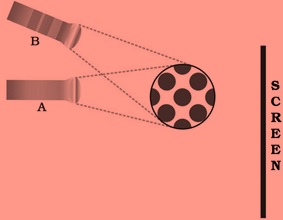
Fig.11.9
The shape of the shadow obtained in two positions is shown in Fig. 11.10.
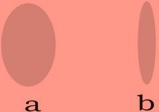
Fig.11.10
Match the position of the torch and shape of the shadow of the ball.
Answer 16
A a
B b
Question 17
A student covered a torch with red cellophane sheet to obtain red light. Using the red light she obtains a shadow of an opaque object. She repeats this activity with green and blue light. Will the color of the light affect the shadow? Explain.
Answer 17
The color of light will not affect the shadow, because shadow is the dark patch formed when an object obstructs the path of light and hence no light reaches in the shadow region.
Question 18
Is air around us always transparent? Discuss.
Answer 18
Air around us is transparent but when thick smoke, thick clouds, etc. are present in the air it does not remain transparent any more.
Question 19
Three identical towels of red, blue and green color are hanging on a clothes line in the sun. What would be the color of shadows of these towels?
Answer 19
The color of shadows of all three towels will be the same.
Question 20
Using a pinhole camera a student observes the image of two of his friends, standing in sunlight, wearing yellow and red shirt respectively. What will be the colors of the shirts in the image?
Answer 20
The colors of the image of the shirts will be the same as the color of the shirt.
Question 21
In Fig. 11.11, a flower made of thick colored paper has been pasted on the transparent glass sheet. What will be the shape and color of shadow seen on the screen?

Fig.11.11
Answer 21
The shadow formed will be dark and of the shape of the flower along with the stalk.
Long Answer Questions
Question 22
A football match is being played at night in a stadium with flood lights ON. You can see the shadow of a football kept at the ground but cannot see its shadow when it is kicked high in the air. Explain.
Answer 22
We can see the shadow of football lying on the ground because the ground acts as a screen for it. However, when the football is kicked high, the ground, which is acting as a screen is away from the football, hence no shadow of the football will be formed on the ground.
Question 23
A student had a ball, a screen and a torch in working condition. He tried to form a shadow of the ball on the screen by placing them at different positions. Sometimes the shadow was not obtained. Explain.
Answer 23
Some of the possible reason can be:
(i) The screen is away from the ball.
(ii) The beam of light from the torch is falling parallel to the screen on the ball.
(iii) The torch is kept away from the ball.
Question 24
A sheet of plywood, a piece of muslin cloth and that of a transparent glass, all of the same size and shape were placed at A one by one in the arrangement shown in Fig. 11.12. Will the shadow be formed in each case. If yes, how will the shadow on the screen be different in each case? Give reasons for your answer.

Fig.11.12
Answer 24
Shadow will not be formed in each case. Shadow will be formed by the sheet of plywood and the piece of muslin cloth. The sheet of plywood will form a dark shadow as it blocks the path of light completely. The piece of muslin cloth will form a lighter shadow as it allow light to pass partially through it.
Yearlong program for Olympiads preparation & to build necessary skills for future.
Explore More
Time to mark your calendar with the upcoming Olympiads exam schedule.
Explore More
Take your Olympiad preparation to next-level by taking LIVE Classes.
Explore More
Assess your performance by taking topic-wise and full length mock tests.
Explore More
Online tuitions for international compeitions like SASMO, SEAMO, etc for Grades 1-11.
Explore More